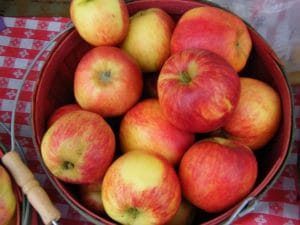Cornucopia’s Take: Organic apples are healthy for your family and the planet – and you may be able to buy them from a local farmer! You can look for farmers near you on Local Harvest’s website.
5 Reasons You Should Always Buy Organic Apples
Rodale’s Organic Life
by Stephanie Eckelkamp
More antioxidants, less toxic pesticides, and better flavor, for starters.
 |
It’s peak apple season—that magnificent time of year when we come home with bushels of Cortlands, Empires, and McIntosh and morph them into everything from apple butter and sauce to pies and crisps (in addition to eating them in their delicious, unadulterated glory, of course).
But depending on how they’re grown, apples can have a dark side—for one, conventional apples are one of the most pesticide-loaded crops out there. (Learn why the apples we eat today are nothing like the ones our grandparents enjoyed.)
So before you choose any old bag of apples at your grocery store or farmers’ market, or a pick-your-own orchard, consider the fact that organic apples are not only a superior choice for your personal health, but the health of the planet.
Here, we rounded up a few of the most compelling reasons to always buy organic apples.
They contain way fewer pesticides
As mentioned above, conventionally grown apples contain some of the highest levels of pesticide residue—they clock in at number four on the Environmental Working Group’s 2017 Dirty Dozen list of contaminated produce, behind strawberries, spinach, and nectarines. According to the EWG, more than 98 percent of samples of apples tested positive for at least one pesticide (and yes, the apples were washed). But you’re probably ingesting more than that—USDA research reveals that some apples may have more than 40 different kinds of pesticides on them.
What exactly are these pesticides doing to your body? For the average person, it’s not always clear, but a group of pesticides called organophosphates (used on about 80 percent of conventionally grown apples) may interfere with normal nervous system function. Symptoms can include depression, anxiety, irritability, memory problems, and more, but this is most often seen with farmers and their families—not the average fruit and veggie consuming person. But even so, why unnecessarily increase your pesticide intake if you don’t have to? (Check out these 10 crazy things pesticides are doing to your body.)
They’re better for the environment
Most organic apple farms select which apples they’ll grow based on regional adaptability (meaning, they’re better suited to survive where they’re being grown) and use integrated pest management tactics to control pests as opposed to loads of chemicals, which can not only make their way into the fruit, but into the soil and nearby waterways as well. (Here’s why supporting healthy soil is one of the most powerful things you can do for your health.)
They’re more nutritious
Sure, organic apples may have a few more blemishes and battle wounds than their shiny conventional counterparts, but that’s more than okay, thanks to their higher nutrient content. A review of 343 studies in the British Journal of Nutrition found that organic produce contains 20 to 40 percent higher antioxidant levels; while another study specifically on apples found higher antioxidant phenols and fruit acids—helpful in preventing metabolic disorders such as diabetes—in organic apples than conventional.
Even more interesting, these higher nutrient levels may actually be due, in part, to those little imperfections and blemishes: Research has shown that blemished and scabbed apples contain more healthy antioxidants called phenylpropanoids, which they produce to ward off pests. Antioxidant and nutrient levels in crops are also correlated with the mineral content and overall health of the soil—both of which tend to be superior in land that’s managed organically.
They just taste better
Higher levels of antioxidants in organic produce seem to result in a better flavor profile, too. The same British Journal of Nutrition study found that higher antioxidant levels affect food’s organoleptic qualities, or its taste, aroma, and mouthfeel. Study researcher Charles Benbrook, in an interview with National Geographic, explains it this way: “the concept of terroir can be traced to particular biological stresses in a region or soil types that impact how a plant responds to stress. The chemicals that a plant produces to respond to stress become part of that plant’s signature taste. People are yearning for more intense flavors, and there’s good news that organic farming accentuates flavor in fruits and vegetables.”
They’re affordable when in season
We get it, organic fruit is expensive. But right now, organic apples are one of the most affordable fruits by-the-pound that you can buy because they’re in season. So stock up and morph your apples into delicious recipes like this amazing homemade slow cooker apple butter that you can enjoy months after apple season ends. Or, as outlined in this HGTV article, you can actually freeze whole or sliced raw apples that you plan to bake with later.

